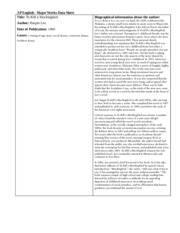- Posts about Major Works Data Sheet written by Henson AP English Literature 'We are all inventors, each sailing out on a voyage of discovery, guided each by a private chart, of which there is no duplicate.
- Meaning from an unfamiliar and challenging work. A dialectical journal is a written conversation with yourself about a piece of literature that encourages the habit of reflective questioning. You will use a double-entry format to examine details of a passage and synthesize your understanding of the text.
AP English Literature and Composition Major Works Data Sheet Title: The Awakening Author: Kate Chopin Date of Publication: 1899 Genre: Realism, Naturalism, Biographical information about the author: Chopin was born in St. Louis, Missouri in 1851.
Reader Response. Write your thoughts, a reaction (typed or hand-written - roughly a page in length) making comparisons, contrasts, and connections between Frankenstein and Ex Machina for Thursday, September 20. You could choose to focus on a couple of characters, story and its meaning, messages of the stories and their authors mean to convey, implications for women, men, or humanity, or something else that might be on your mind. Lemy wondered whether a Venn Diagram would be OK? And, that would be fine as well.
Literary Theories Glossary
Farewell Speech--These speeches must be conducted by Friday, May 25. Speeches will be given during the last week of classes.
Sample Outlines
Paired Poetry Prompt: You should probably spend no more than an hour total on this assignment. Read and annotate the prompt for no more than ten minutes. Use your pen-name and your I.D. Single-space your essay. Type the prompt and then begin typing your essay. Submit to Turnitin.com by 11:59 April 25.
Paired Poetry Prompt
Addison Prompt Assignment: You should probably spend no more than an hour total on this assignment. Read and annotate the prompt for no more than ten minutes. Use your pen-name and your I.D. Single-space your essay. Type the prompt and then begin typing your essay. Submit to Turnitin.com by 11:59 April 22.
Addison Prompt
Tartuffe translated by Richard Wilbur (PDF)
Complete Mozart Movie Handout to discuss on Monday, April 9. If you don't have it CLICK THIS. Our substitute, Don Porath, has it, so if you ask, then he will likely pass it out.
All Reading below on Bacon, Addison, and Swift is in the Purple Text. Due Wednesday, April 11: Complete answers to questions (e.g., words such as 'answer,' 'list,' or 'complete' with a high degree of probability mean you should write something on your own notebook paper) on your own notebook paper Wherefore now? What's the rationale? Dense texts such as these, that you are asked to read, though you may choose not to read, you might try to read. I'm not a pupateer, include ample low frequency vocabulary, make one wonder how people 200 to 400 years ago {from 1066 through 1800, consider Mary Shelley who we've recently read} developed better vocabularies and means of expression than we have do today. We have to wonder how, without the modern technological advancements of modern times (e.g., the internet, google, instant access to dictionaries and grammar), writers of 200 to 400 years ago were able to go beyond our ability to express ideas through vocabulary and narrative. Through older texts we have the unique opportunity to better understand history and context, as well as, critically think about the right here and right now. So, the rationale for reading this stuff is to work with difficult vocabulary and grammar which also helps us become better critical thinkers - the goal is not to indoctrinate what these writers thought, but rather to alow them to deveop what they might have been thinking. In any event do the following:
Francis Bacon:Read 'To Be or NotTo Be' on p. 317; Read about Francis Bacon in Build Background on p. 442 and p. 448; Define the word aphorism; Read Bacon’s 'Of Marriage and Single Life' pp. 445-447; List at least two aphorisms from this reading; On page 447, answer questions 1 through 4 on this reading.
Joseph Addison: Read about Joseph Addison in Build Background on p. 548 and on p. 553; Know the definitions of the 11 Words to Know on p. 548; Read all of the articles from The Spectator pages 549-551; Answer all questions, 1 through 7, on page 552.
Jonathan Swift: If you have not read pages 584-585 on satire, then do so. Know the difference between Horatian and Juvenalian satire. Read about Jonathan Swift pp. 586-589. Read Build Background information on p. 611. Know the definitions of the 11 Words to Know on p. 611. Complete the 'Vocabulary in Action' on p. 623. Read Swift's 'A ModestProposal' pp. 612-619.As you are reading consider anything that might be ironic or absurd. Answer questions 1, 3, 4, 5, 6, and 8 on p. 620.
To Submit your Poetry Essays go to: Turnitin.com and create a new account as a student. You will need an email address.

https://turnitin.com/newuser_type.asp?lang=en_us
The Enrollment Key is: Nunnery
The Class ID is: 17724882
When uploading your essay, you must ensure that it falls under any of the file types listed below: Adobe Acrobat PDF (.pdf) HTML (.html, htm) Microsoft Word (.doc) Plain text (.txt) PostScript (.ps) Rich Text Format (.rtf) WordPerfect (.wpd)
When you submit, you can change what you upload by selecting the drop-down menu and choosing:
Heart Of Darkness Major Works Data Sheet
Rubric for AP Prompt Writing
Major Works Data Sheet Ap Literature
Sonnet Templates:MS WordGoogle Doc